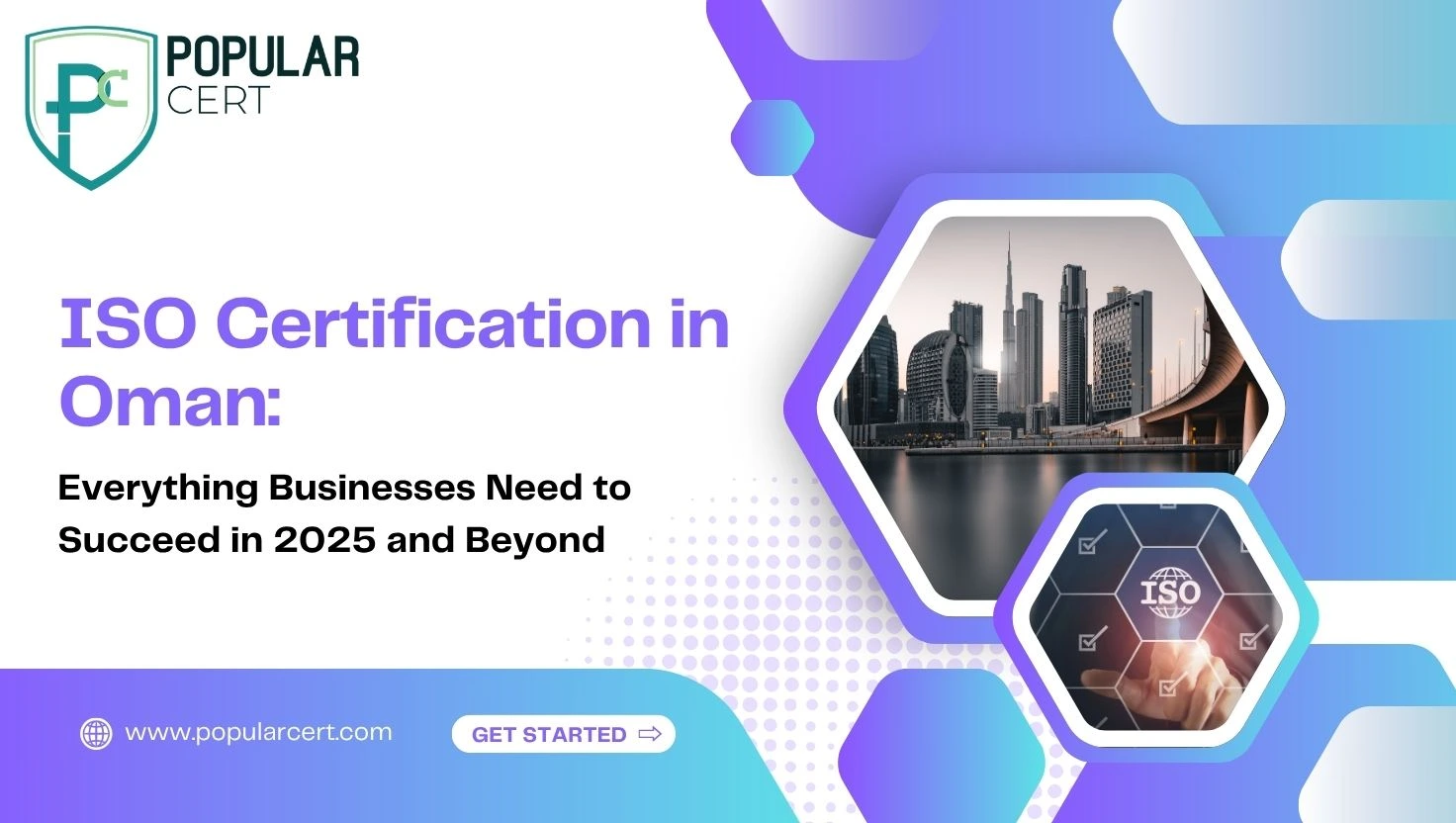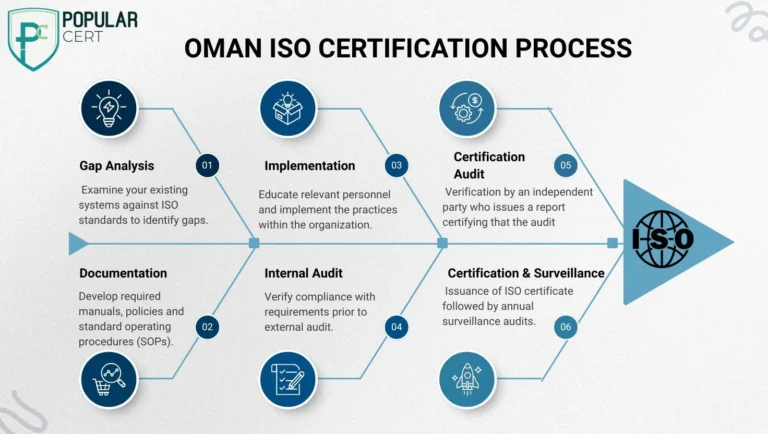ISO Certification in Oman: Everything Businesses Need to Succeed in 2025 and Beyond

With ISO standards, you can unlock worldwide possibilities, ensure regulatory compliance, and build trust simultaneously.
ISO Certification has become a powerful lever of attaining trust, operational efficiency along with greater returns within the business ecosystem in Oman. With sectors such as Manufacturing and Logistics, Construction Industry or Healthcare, even IT having international alignment is now increasingly vital from both domestic and global standpoints.
This exclusive comprehensive guide aims towards covering each segment Omani companies must understand about ISO Certification Oman by not only focusing upon its value but also the starting roadmap alongside benefits matched ahead.
Why invest in ISO certification today for oman business's
The government’s active drive on implementing vision 2040 has given rise to further investment into major sectors like tourism & infrastructure deploying certified compliances benchmarked under enhanced accountability.
ISO Certification aids this transformation by:
- Offering established frameworks for quality, safety, and compliance.
- Enhancing trust in the supply chain for public and private contracts.
- Augmenting Oman’s global business image.
For companies, ISO adherence translates to streamlined processes, reduced legal liabilities, and wider market access.
What is ISO Certification?
Definition and Global Relevance
The International Organization For Standardization develops universal standards that help industries balance quality, risk, and performance across multiple spheres of operation.
Meeting these standards enables an organization to receive ISO Certification from a recognized body.
How ISO Applies To Omani Businesses
In Oman, achieving ISO Certification is fast becoming mandatory for government tenders and Public Private Partnerships (PPPs) along with partnerships with foreign stakeholders. It boosts your image in the market while providing better value than non-certified players.
Popular ISO Standards in Oman
ISO 9001 – Quality Management Systems
- Focuses on continuous improvement as well as customer satisfaction.
- Ideal for all sectors focusing on consistent delivery of quality services or products.
ISO 14001 – Environmental Management Systems
- Helps firms achieve relevant environmental regulations and sustainability objectives.
- Critical for oil & gas, construction, and manufacturing sectors.
ISO 45001 – Occupational Health & Safety
- Promotes safety and reduces the likelihood of accidents alongside liabilities.
- Useful in high-risk areas such as construction and logistics.
ISO 27001 – Information Security Management
- Creates policies on how to safeguard private information.
- Important for companies in IT, telecom, banking, and public services.
ISO 22000 – Food Safety Management
- Aims at organizations engaged in food manufacturing, processing, and catering services.
- Safeguards food safety from the primary industry to consumption.
Types Of Certification
- ISO Certification
- ISO 9001 Certification
- ISO 14001 Certification
- ISO 45001 Certification
- ISO 22000 Certification
- ISO 27001 Certification
- ISO 17025 Certification
- ISO 13485 Certification
- ISO 20000-1 Certification
- ISO 22301 Certification
- ISO 50001 Certification
- ISO 37001 Certification
- IATF 16949 Certification
- ISO 29001 Certification
- ISO 31000 Certification
- ISO 20121 Certification
- ISO 10002 Certification
- ISO 41001 Certification
Get Free Consultation
Our Clients


















Oman ISO Certification Process
Outline provides a comprehensive overview

Choosing an ISO Consultant in Oman
Role of a Consultant
- Prevents wasting time and costly mistakes.
- Offers useful expertise and accompanies audits throughout masterfully.
What to Look for
- Relevant experience tailored to your company.
- Understanding of local and Omani legal frameworks.
- Offering full service, from training and documentation to audits.
Why Choose Popularcert
- They are ISO consultants with appropriate certifications alongside extensive experience.
- Provides preset operational models but customizes them to the particular business model.
- Uses compliant yet cost-efficient techniques that optimize time while meeting all regulatory requirements.
Benefits of Holding an ISO Certification for Companies in Oman
- Builds trust from customers, partners, and governmental bodies.
- Streamlined processes improve organizational efficiency along wasteful activities removal.
- Enhanced market access within the region and beyond.
- Enhances employee safety alongside productivity levels.
- Eases compliance with industry regulations including tendering processes.
Oman's Industries Provided With The ISO Most Impacted By Certification
- Oil & Gas operations : ISO 14001 and ISO 45001 on safety and environment standards.
- Logistics And Ports : Employing the assurance of service reliability through use of ISO 9001 certification.
- Hospitality and food industries: ISO 22000 for food safety and hygiene protocols.
- IT and Telecom: ISO 27001 for information security concerns.
- Public Sector: ISO 9001 and ISO 37001 for bribery-prevention systems, transparency, anti-bribery measures credentialing.
ISO Certification in Oman: 2025 Trends to Watch
- Increased acceptance of government policies requiring ISO standards in contracting and procurement.
- Policies on ecological sustainability driving demand for certification under ISO 14001.
- The upsurge of interest in cybersecurity raises attentiveness toward ISO 27001.
- Pandemic acceleration towards digital tools drives adoption of iso standard for SMEs boosting credibility perception.
How to Get Started with ISO Certification in Oman
Pre-certification checklist tasks
- Select the appropriate standard from the isos catalogue relevant to your industry.
- Assess your organization’s workflow against the benchmarks relevant to the selected standard.
- Obtain a Popularcert as a consultant; one respected in the industry.
- Design training sessions that align with organizational objectives while providing necessary knowledge and skills.
Receive Professional Advice from Popularcert
- No-Cost Consultation & Gap Evaluation ServiceOffer
- Structured pathway with comprehensive guidance on required documentation.
- Assistance with post-audit activities aimed at sustained compliance.
Ready To Attain ISO Certification In Oman?
Whether you’re new or you’re seeking system enhancements, Popularcert simplifying steps involved in obtaining ISO Certification processes tailored to omans specific needs ensures a swift journey to certification.
Reach out Popularcert now to book risk-free strategy sessions aimed at operational improvement verifiable by external stakeholders including regulatory bodies.
GET A FREE CONSULTATION NOW
FAQs
What is ISO Certification and why is it important for businesses?
ISO Certification confirms that a business meets international standards for quality, safety, or efficiency. It builds customer trust, improves operations, and opens doors to global markets.
How long does it take to get ISO Certified?
The ISO certification process typically takes 1 to 6 months, depending on the size of the organization, the chosen ISO standard, and readiness for implementation.
What are the most popular ISO standards for businesses?
The most common ISO standards include ISO 9001 (Quality Management), ISO 14001 (Environmental Management), ISO 45001 (Occupational Health & Safety), and ISO 27001 (Information Security).
Is ISO Certification mandatory for companies?
ISO Certification is not legally mandatory, but it is often required for tenders, contracts, and international trade, especially in regulated or competitive industries.
How much does ISO Certification cost?
Costs vary based on your organization’s size, the ISO standard, and consultant fees. It’s considered a strategic investment that brings long-term savings and credibility.
